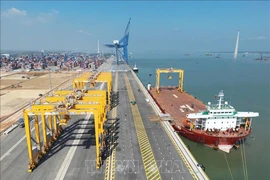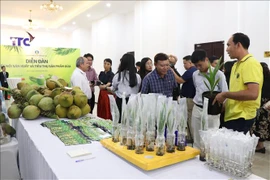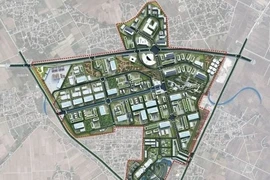1. Issuance of six resolutions on regional socio-economic development
For the first time, the Politburo issued six resolutions on socio-economic development and defence-security safeguarding for 2030, with a vision to 2045, for six regions to tap into advantages of each region while enhancing connectivity within each region and among different regions.
2. Faster-than-expected GDP amid bleak world economic situation
Vietnam’s GDP growth reaches 8.02% this year, a record high in the 2011-2022 period as the economy is recovering strongly.
Trade turnover set a new record of over 730 billion USD, with Vietnam enjoying a trade surplus of 11 billion USD, or more than three-times higher than in 2021.
These are impressive results amid undermined growth momentum of the world economy and soaring inflation and living expenses.
3. Issuance of national master plan for 2021-2030
In October, the Government issued a Resolution on the national master plan for 2021-2030, with a vision to 2050.
This was the first time a national master plan had been built on the basis of the Law on Planning and the resolutions and conclusions of the Party Central Committee, Politburo, and National Assembly on national socio-economic development in the time ahead.
The plan specifies the distribution and arrangement of space for socio-economic, defence, security, and environmental protection activities that are nationally and internationally important and strategically inter-regional in the territory, including the mainland, islands, archipelagoes, sea areas, and skies.
4. Int’l organistions’ upgrade of Vietnam’s credit ratings
In 2022, three leading credit rating agencies in the world, namely Moody’s, Standard & Poor’s, and Fitch Ratings, made positive assessments of Vietnam’s credit ratings. On September 6, Moody’s upgraded Vietnam’s long-term issuer and senior unsecured ratings to Ba2 from Ba3 and changed the outlook to stable.
Vietnam was the only in the Asia-Pacific and one of the four countries in the world for which Moody’s raised the ratings.
5. Continual adjustment of regulatory interest rates, exchange rates
For the first time, within more than one month (from September 23 to October 25), the State Bank of Vietnam continually adjusted the regulatory interest and exchange rates, with the regulatory interest rate and deposit interest rate ceiling raised twice, and the USD/VND trading band expanded from +/-3% to +/-5%.
The flexible governance by the Government and the central bank has helped contain inflation and enhance people, businesses, and investors’ trust in Vietnam’s investment climate.
6. Vietnam named first country to successfully develop, produce African swine fever vaccines
Vietnam was the first country to have successfully developed and produced two African swine fever vaccines, NAVET-ASFVAC, and AVAC ASF LIVE, which are the first commercial vaccines for this disease.
The Ministry of Agriculture and Rural Development is set to put the vaccines into use nationwide in early 2023. This success has also opened up prospects for exporting African swine fever vaccines.
7. Many new records in stock market
In 2022, VN-Index surpassed 1,500 points for the first time, but dropped to less than 900 points within over six months. Such fluctuations have turned VN-Index into one of the most volatile indexes in the world.
In the first 11 months, individual investors opened nearly 2.5 million new securities accounts, the biggest number in the 22-year history of Vietnam’s stock market.
Amid the market’s hot growth and signs of stock price manipulation, authorities have taken strong actions to tighten discipline and improve the health of the market.
8. Strong fluctuations on corporate bond market
The corporate bond market, a medium- and long-term capital mobilisation channel, was negatively affected when investigations were launched into some cases, involving wrongdoings in corporate bond issuance. Individual investors sold bonds before maturity, due to concerns over businesses’ failure to repay debts.
To rectify activities in this market, the Government released a new Decree on September 16 to amend the existing decree that stipulates rules on corporate bond offerings. It also requested the Ministry of Finance to continue overhauling the new Decree, in order to guarantee publicity, transparency, the legitimate rights and interests of investors, along with the safety and security of the financial, and monetary markets.
9. Electronic toll collection applied nationwide
On August 1, all expressways nationwide applied electronic toll collection. Piloted since 2015, the electronic toll collection application encountered difficulties after repeated delays. The concerted implementation of electronic toll collection is expected to help improve service quality, reduce travel time and expenses, ease traffic congestion and environmental pollution, promote convenience and transparency, and safe management and supervision costs.
10. Fuel shortages in many localities
In October and November, residents in many localities had to wait in long queues to buy fuel. This situation came as a result of complex developments in the global oil market, and it also revealed problems in the management of petrol and oil trading.
As directed by the Government, the Ministry of Finance, the Ministry of Industry and Trade, and the State Bank of Vietnam promptly carried out solutions to tackle this situation./.



















